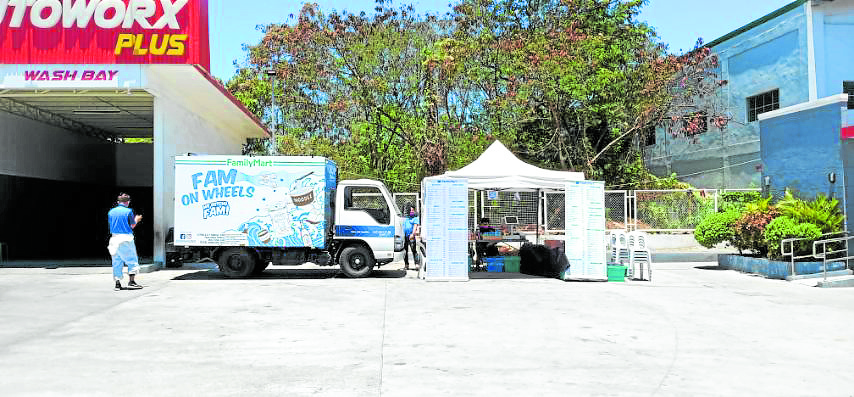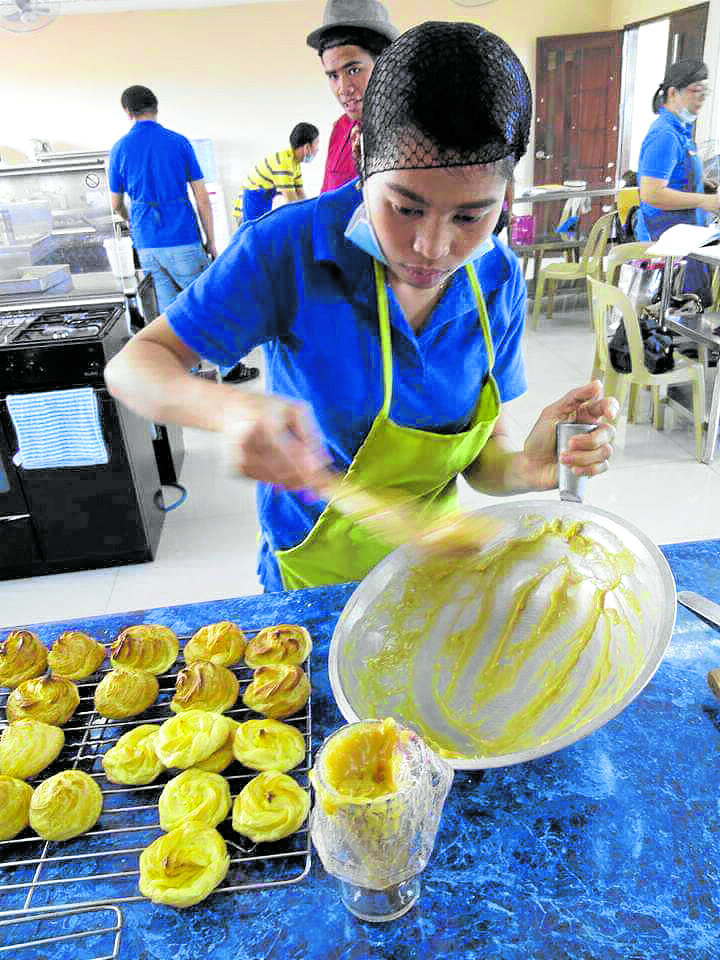Delivery services see big, small businesses through pandemic

FamilyMart used rolling stores during the enhanced community quarantine but also turned to delivery services through Facebook and Grabfood.
These days, it seems, anything and everything can be found and bought online and brought to one’s doorstep.
What enable this are the ubiquity of smartphones, the availability of internet connection and the swarms of motorcycles and utility vehicles, thanks to low interest rates over the past few years.
The same few years before the pandemic now seem like a far distant past considering the radical changes we have seen at work and at home. But even then, one of the corporate catchphrases was “disrupt or be disrupted” or, more ominously, “innovate or be obsolete.”
Indeed, many enterprises did so, for example by going— as the corporate vernacular puts it—all-digital in the way they execute their business or migrating to the cloud or automating business processes, etc.
Thence, also, saw the rise of mobile application-based business models made obvious by ride-hailing services, on-demand content consumption (aka “streaming”) and financial technology such as e-wallets.
Article continues after this advertisementOf course, if there were first adopters, there were also laggards, be it due to budget constraints, complacence or plain obstinance. With the onset of the ultimate disruptor, the new coronavirus plague itself, little space was spared for stragglers in innovation.
Article continues after this advertisementAs key markets if not entire populations were forced to work, study or simply stay at home, businesses needed to go where the customers are because, literally, no one was coming to them. Thus, enterprises both big and small have turned to delivery—as opposed to in-store dispatch of their products—as a transitory if not permanent means of business continuity.
For example, Fast Retailing Co. Ltd. finally launched their Uniqlo Online store in the Philippines last July after years of being unavailable here, partnering with Air21 for deliveries.
In May, homegrown conglomerate San Miguel used their Petron fuel stations as sites for rolling stores—refrigerated food trucks that offer their other brands such as Monterey meats and even ready-to-eat goods that are intended mainly for business customers such as restaurants.
Today, the food trucks may no longer be rolling but the products continue to be available off-premises, through online ordering and delivery.
As early as April during the enhanced community quarantine, independent oil firm Phoenix Petroleum Philippines Inc. had also turned to rolling stores and delivery services to ensure continuous operations of its FamilyMart convenience store chain. For this, FamilyMart used its Facebook page as well as GrabFood services.
“While many of our stores remain open to be of service, we want to bring FamilyMart closer to where we are needed,” said Henry Albert Fadullon, who has moved up as president of Phoenix from chief operating officer at the start of the pandemic.
“FamilyMart will continue to innovate and adapt its services depending on the needs of the community,” Fadullon said.
FamilyMart is continuing with the delivery services, although more recently, they have introduced in Cebu City a shop-through-the-window purchasing format for walk-in customers as well as drive-through shopping for motorists.
For businesses that have no benefit of a large network of retail, delivery services are proving to be even more crucial.
Elmie Marquez Domingo, who trained in baking at the Technical Education and Skills Development Authority, started her entrepreneurial journey before COVID-19 by selling cupcakes, cookies, cakes, brownies and caramel bars that she herself made.
“I trained in baking since I am very fond of desserts,” Domingo said. “At first it was a sideline, and my husband and I sold my products to colleagues at work, friends and relatives. And then I tried to expand my market through Facebook and Instagram.”
This small business gained a following as Elmie’s Cake and Pastries Creation. Ironically, even for an online-dependent venture such as hers, community quarantine caused Domingo’s business to falter.
“People were forced to stay at home and they needed things to keep them busy,” she said. “Many turned to baking. They are now making their own desserts and this meant fewer orders of my products.”
The mother of a 5-year-old compensated by accommodating bulk orders and also expanded her portfolio with plasticware such as cabinets, plant pots, laundry baskets, and such. Still, another irony was that community quarantine hampered the delivery of Domingo’s offerings.
“Many addresses were not accessible up to the doorstep because of quarantine,” she said. “Lalamove and such were not allowed into many subdivisions and customers are not willing to walk to the gates to pick up their purchases.”
Their answer was to make the deliveries themselves, using the family’s subcompact hatchback. “My husband works from home but with lessened workload. In effect, he has long weekends and that gives him time to make deliveries with me,” Domingo said.
A report titled “e-Conomy SEA (Southeast Asia) 2020”—jointly released by Google, Temasek and Bain & Co.—described the current situation of the digital economy as “resilient and racing ahead [at full velocity].” This study was based on an online survey that ran from Aug. 18 to Sept. 9.

Elmie Marquez Domingo’s love of desserts prompted her to train in baking and set up her own venture.
In the Philippines alone, they observed that food delivery and e-commerce were going strong with growth rates of 48 percent and 58 percent year-on-year, respectively. And, as observed elsewhere in the region, Filipinos have made the “flight to digital” and are “online with a purpose.”
“In the Philippines, given the extensive COVID-19 lockdown periods, users went online searching for solutions to their sudden, new challenges,” the report said.“A significant number tried new digital services: 37 percent of all digital service consumers were new (slightly higher than the Southeast Asia average), with 95 percent of these new consumers intending to continue their behavior postpandemic.”
The study shows that before the pandemic, Filipinos were spending four hours online for personal use. This shot up to 5.2 hours at the height of the lockdowns in April and May—the longest online time across Southeast Asia. Now it has settled to 4.9 hours daily.
“With eight out of 10 users viewing technology as very helpful during the pandemic, it has become an indispensable part of people’s daily lives,” the report said. INQ
